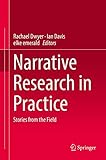Narrative Research in Practice [electronic resource] : Stories from the Field / edited by Rachael Dwyer, Ian Davis, elke emerald.
Material type: TextPublisher: Singapore : Springer Singapore : Imprint: Springer, 2017Description: XVII, 245 p. 17 illus. online resourceContent type: text Media type: computer Carrier type: online resourceISBN: 9789811015793Subject(s): Education | Educational sociology | Education -- Philosophy | Social sciences | Education and sociology | Sociology, Educational | Education | Sociology of Education | Educational Philosophy | Methodology of the Social SciencesAdditional physical formats: Printed edition:: No titleDDC classification: 306.43 LOC classification: LC189-214.53Online resources: e-book Full-text access
TextPublisher: Singapore : Springer Singapore : Imprint: Springer, 2017Description: XVII, 245 p. 17 illus. online resourceContent type: text Media type: computer Carrier type: online resourceISBN: 9789811015793Subject(s): Education | Educational sociology | Education -- Philosophy | Social sciences | Education and sociology | Sociology, Educational | Education | Sociology of Education | Educational Philosophy | Methodology of the Social SciencesAdditional physical formats: Printed edition:: No titleDDC classification: 306.43 LOC classification: LC189-214.53Online resources: e-book Full-text access | Item type | Current library | Collection | Call number | Copy number | Status | Notes | Date due | Barcode |
|---|---|---|---|---|---|---|---|---|
| E-Books | MEF eKitap Kütüphanesi | Springer Nature | LC189 -214.53 (Browse shelf (Opens below)) | Available | NATURE | 1419995-1001 |
Chapter 1 Narrative research in practice: Navigating the terrain -- Chapter 2 Autoethography: Is my own story narrative research? -- Chapter 3 Saying goodbye to Mr Chips: Masculinity, narrative and identity construction -- Chapter 4 Critical junctures in narrative research: Collaborative reflections on methodological issues -- Chapter 5 If you see what I mean? Visual narratives - stories told through, with and by visual images -- Chapter 6 Where words fail: Storying audio-visual data -- Chapter 7 Sensual, sensory and sensational narratives -- Chapter 8 Who is asking the questions? Using co-constructed interviews in the study of Perceived Discrimination from a discourse analytical perspective -- Chapter 9 Insights into Disability and Giftedness: Narrative methodologies in interviewing young people identified as twice exceptional -- Chapter 10 The IELTS roller coaster: Stories of hope, stress, success, and despair -- Chapter 11 The power and possiblity of narrative research: Challenges and opportunities.
This book directly addresses the multiplicity and complexity of narrative research by illustrating a variety of avenues to pursuing and publishing research that falls under the umbrella of narrative work. The chapters are drawn from a wide range of disciplines including education, literary studies, cultural studies, music and clinical studies. Each chapter considers a particular methodological issue or approach, illustrating how it was addressed in the course of the research. Each of the chapters concludes with a set of discussion exercises and a further reading list. The book offers a valuable resource for established researchers seeking to expand their methodological and theoretical repertoire, and for graduate students and researchers new to narrative methods.
5
